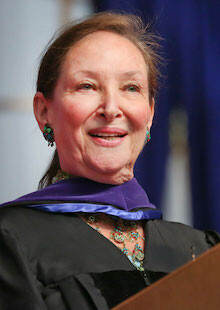Justices Discuss Courts’ Authority in Challenging Times

Two prominent jurists from their countries’ highest courts explored how the judiciary maintains legitimacy when an increasingly polarized public more frequently questions their authority during a Yale Law School forum last week.
Associate Justice of the United States Supreme Court Stephen Breyer and Canada Supreme Court Justice Rosalie Silberman Abella were the speakers for the 2021 Anderson Lecture, “The Authority of the Courts and the Perils of Politics,” which is also the title of Breyer’s new book. The event took place in an online webinar format on September 9, 2021.

The topic could not be timelier, Dean Heather Gerken, the Sol & Lillian Goldman Professor of Law, said in her introduction.
“The role of courts and the law, particularly in recent years, have undergone serious challenges of legitimacy, both in the United States and abroad,” Gerken said. “Nonetheless, today’s guests have ultimately wielded their authority as jurists to — to paraphrase one of our guests today — yield better law.”
Breyer began by outlining historic Supreme Court cases, starting with Worcester v. Georgia. The court ruled in this case that the Constitution gave Congress, not the states, the authority to make laws regarding Native Americans. The decision would have been a victory for Cherokees fighting encroachment on their land. However, President Andrew Jackson refused to enforce the ruling and states also ignored it.
Next was Brown v. The Board of Education. The landmark school desegregation ruling was flouted by local authorities and segregation only started to end after much violence and struggle. Nevertheless, Breyer said, the eventual enforcement of the ruling was a victory for the rule of law.
Finally, Breyer cited Bush v. Gore, which ended the state of Florida’s recount in the 2000 presidential election. Many disagreed with the majority ruling — including Breyer, who wrote the dissent. But there was a striking difference between that case and his two earlier examples. People accepted the ruling. By 2000, “the country didn’t pay attention especially to following the court,” he said. “They assumed it, like the air around us.”
Breyer concluded by saying that the argument for the rule of law is best illustrated by the Albert Camus novel The Plague. In the story — an allegory for Nazi occupation of France — the plague germ doesn’t die but lurks and threatens to reappear. Authoritarianism is like that germ, according to Breyer.
“It’s that plague germ that lurks in everyone and the rule of law is one of the weapons that human beings have developed against that plague,” he said.
In her response, Abella stressed the importance of judges retaining their integrity.

“My strong belief is that only time will judge how successful judges and courts will be seen to have acted in the public interest and the court’s legitimacy and authority,” she said. “Which means that judges have to stay true to their own integrity and not keep their fingers on the fluctuations of the national pulse.”
To protect the court’s legitimacy, Abella said, judges should understand the diversity that makes up their countries, listen to arguments in the cases before them, and not impose their preexisting perceptions on them.
“Above all, we need to embrace humility and see the world we judge with rigor and compassion from the ground up, not from our exalted tops down,” she said. “This won’t cauterize controversy, but it will protect our integrity and there’s no legitimacy without integrity.”
Arthur Liman Professor of Law Judith Resnik, the discussion’s moderator, asked the speakers what ought to support the authority of courts. Abella replied that judges, if they are to avoid looking to the public for direction, are not the ideal group to answer that question. However, she acknowledged, “At the end of the day, the legitimacy of the court is the perception of legitimacy.”
Breyer responded to questions from the audience that the decline in positive perceptions of the court is part of a larger decline of trust in instructions — itself a serious problem.
“Now it’s up to you,” he said, referring to young people. “When I talk to students about it…this is a source of hope.”
The Robert P. Anderson Memorial Fellowship Lecture was established by former law clerks and friends in memory of Robert P. Anderson ’29, Senior Judge for the U.S. Court of Appeals for the Second Circuit. The lecture is part of the Gruber Program for Global Justice and Women’s Rights and takes place during the annual Global Constitutionalism seminar.


